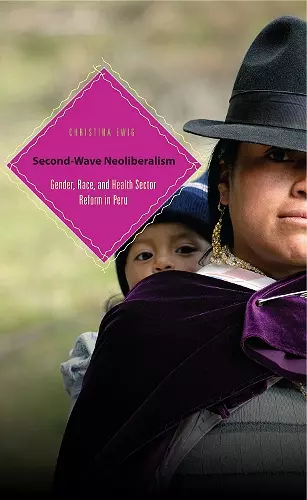Second-Wave Neoliberalism
Gender, Race, and Health Sector Reform in Peru
Format:Hardback
Publisher:Pennsylvania State University Press
Published:29th Jun '10
Currently unavailable, and unfortunately no date known when it will be back
This hardback is available in another edition too:
- Paperback£34.95(9780271037127)

The first wave of neoliberal reform that swept across Latin America in the early 1990s focused on economic policies favoring structural adjustment, such as currency devaluation, cuts in state-supplied social services, and removal of protection for domestic industry against global competition. This wave has been the subject of widespread debate and criticism for its negative impact on the most vulnerable strata of society. But the second wave of the mid-1990s, which saw the introduction of many social policy reforms, has not received nearly as much attention. Christina Ewig seeks to correct this imbalance in scholarly research by presenting a case study of the multifaceted efforts to reform the health sector in Peru under the Fujimori regime.
Second-Wave Neoliberalism combines top-down analysis of policy formation with bottom-up analysis of policy implementation using both qualitative and quantitative approaches—interviews and ethnographic observations along with formal surveys. Ewig’s findings lead her to conclude that neoliberal health reforms have brought greater social stratification and, in many ways, have increased gender, racial, and class inequity. But the story is complex, with real progress in some areas and surprising paradoxes in others, such as feminist involvement in family planning policy that resulted in a massive sterilization program targeting poor, indigenous women.
“Christina Ewig has written a first-rate book that makes contributions on several different levels. On the one hand, it integrates central political science concerns about the impact of welfare legacies and epistemic communities with a growing literature on gender equality and politics. At the same time, the book explores these issues through a compelling history of Peruvian health policy, focusing especially on the evolution of services shaped in response to the demands of male-dominated unions and then on efforts to restructure the system in the 1990s and early 2000s. Ewig’s analysis is all the more impressive because it is informed by extensive fieldwork that she conducted in Peru over the course of several years. Besides the obvious appeal this book will have for specialists in Peru, it should be of great interest to students of comparative social policy and of the complex politics of gender, intersectionality, and historical legacies.”
—Robert Kaufman, Rutgers University
“Christina Ewig's book, with its focus on the social dimensions of social policy, is a most welcome contribution to the study of social policy in Latin America. Its examination of the gendered and racialized impacts of neoliberal reforms in social provision is richly illustrated by case studies from Ewig's many years of fieldwork in Peru. It leaves the reader in no doubt that deep social inequalities in provision persist largely unchallenged. Ewig convincingly shows that if women's rights organizations are to address these inequalities, they need to pay greater attention both to the power politics of policymaking processes and to the consequences of neoliberal reforms, such as decentralization and privatization, for disadvantaged populations. This book will be essential reading across a range of disciplines and will be valued especially for tackling previously under-researched issues in the social policy field.”
—Maxine Molyneux, Institute for the Study of the Americas, School of Advanced Study, University of London
“In Second-Wave Neoliberalism, Christina Ewig offers careful and skilled intersectional analysis of the complex arena of policy reform—and this outstanding book is an example of such research at its best. Ewig's narrative emphasizes the centrality of gender, race, and class to the process of health sector reform and thus demonstrates the importance of looking at all three factors when assessing policy change. The book is a tremendous contribution to the gender and feminist studies literature.”
—Lynne Haney, New York University
“Cristina Ewig skillfully shows us gendered inequality in access to basic services cannot be attributed solely to neoliberal reforms, especially in Peru. . . . Hopefully students of policy, health reform and Latin American politics will all see the benefit of this.”
—Jelke Boesten Journal of Latin American Studies
“Graduate students and professionals alike will find this extensive and constantly engaging research beneficial because it raises important questions and gives valuable insights for those in the field of gender and social policy.”
—Constanza Tabbush Bulletin of Latin American Research
ISBN: 9780271037110
Dimensions: 229mm x 152mm x 25mm
Weight: 567g
272 pages